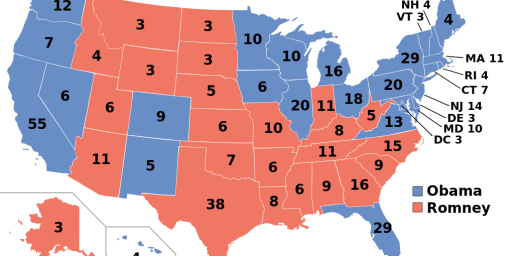Colorado Considers Changing Electoral College Rules
George Will attacks a proposal noted on the ballot in Colorado:
November’s most portentous vote is not for president. It is Colorado’s vote on abandoning, beginning this year, the winner-take-all allocation of the state’s electoral votes. Instead, they would be divided according to each candidate’s percentage of the popular vote.
As I noted two months ago when rumors of this move first surfaced, I’m especially concerned with changing the rules after the fact. I believe this would be successfully challenged in court if it altered the outcome of the election.
Will then goes on to frame a well-crafted defense of the winner-take-all system that prevails in all states but Maine and Nebraska on the grounds that it breeds civil majorities and promotes the virtues of federalism.
American majorities are not spontaneous; they are built. A two-party system builds moderate majorities by assembling them from coalitions of minorities. In multiparty systems, parties proliferate, each representing intense minorities. Then a group of parties strives to govern through (often unstable) coalitions improvised after the election.
I’m less sold on the federalism argument than Will for two reasons. First, federalism is in many ways a myth in today’s mobile society. Many if not most Americans have little allegiance to their state because they have only lived there a short period and, frankly, because they see the national government as being more important. Second, the winner-take-all model has many of the advantages Will enumerates. Many of these have flip sides, however. There are now only a handful of states considered “in play.” While the swing states, like Colorado, would certainly receive substantially less attention under a pure popular vote system, states like California, New York, and Texas would suddenly become important again, as candidates would have an incentive to increase turnout. (This would not necessarily hold for a Maine-Nebraska model.)
It is also not entirely clear to me that the majorities we create by dividing the country along geographical lines are necessarily “moderate.” Certainly, at the micro level that is true. Compared to a proportional representation system, which encourages the proliferation of multiple, ideological parties, a winner-take-all (actually, first-past-the post, since mere pluralities are sufficient in the general election) system encourages moderation by promoting two “catch-all” parties that are rather centrist. At the macro level, though, we have the “Red America” versus “Blue America” phenomenon. As Brad DeLong and others have noted, we’re really a “purple” country. But by drawing artificial lines and rewarding minor differences, we encourage absolutely ruthless campaigning, gerrymandering, and many other ills.
From a strategic standpoint, I’m curious as to whether Colorado is essentially engaging in unilateral disarmament. If 47 of 50 states are winner-take-all, one would think that Colorado would have much less leverage come 2008 if the initiative passes. Has anyone read any studies of this phenomenon with respect to Maine and Nebraska?





The more mobile elements of our society reside on the East Coast, where certain metropolitan areas–such as Washington D.C. and NYC–draw from more than one state, where a someone who considers himself a resident of the Washington DC area might live in Virginia, or Maryland, or whatever, and it’s all the same to that resident. Other mobile elements of society are drawn to their ultimate destinations–such as California or Florida.
On the other hand, I know of a large number of residents of Midwest states who have lived in the same place for the entirety of their lives (excluding some service time). These are the people who would lose regional power in a federalist system with the abolition or alteration of the electoral college.
When Colorado was admitted to the Union by a vote of the Congress, it was allotted Electoral Votes in accordance with the US Constitution. If Colorado wishes to alter the meaning of that allotment, Congress should also have a role, since Colorado wishes to change its agreement.
Brooks: Actually, the Constitution says virtually nothing about how a state allocates its electoral votes. Indeed, there’s nothing requiring them to even have elections–the state legislature could just appoint Electors. And Maine and Nebraska already allocate Electors via a different system than the other 48 states.
Both Maine and Nebraska are smaller than Colorado, and Nebraska didn’t go to their current system until 1996, so the impact of their “unusual” allotment of electors has been minimal. In 2000, Maine gave its 4 votes to Gore; Nebraska, its 5 to Bush. There was no split in 1996, either.
Actually, if Colorado is trending Republican long-term, which I believe is quite likely, this proposal should HELP Colorado in terms of receiving attention from presidential candidates (and incumbents). Oddly, the initiative is poorly designed to maximize Democratic electors, as well.
Amendment 36 would change how Colorado’s electoral votes are allocated for this (2004) election not 2008 as stated in the top article on this page.
Sorry, it is Amendment 34.
I hope this amendment passes. As a California voter from the Green Party, I would like to see the stranglehold of the two party system be loosened.
I fear that as the reality sets in for Colorado Democrats that this PR system would give alternative parties a new respect that they will turn against its intitial attractiveness.
If they know what’s good for them, Libertarians and Greens and independents in Colorado should be fighting hard for this initiative.